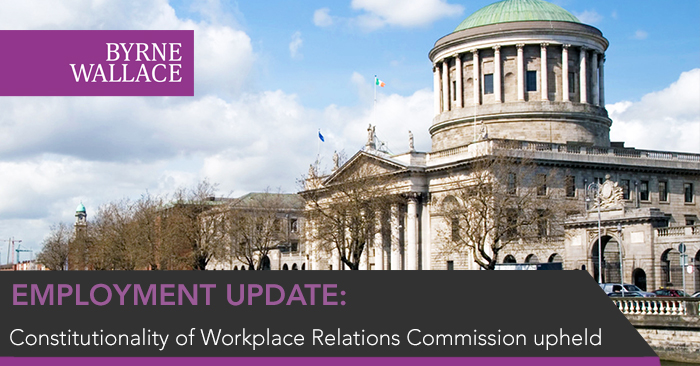High Court upholds the constitutionality of the Workplace Relations Commission
Wednesday, 22 April 2020
The High Court has rejected challenge to the constitutionality of the Workplace Relations Commission (“WRC”). Judgment in the case of Zalewski v Workplace Relations Commission [2020] IEHC 178 was given on 21 April 2020.
Mr Zalewski argued that the WRC was unconstitutional for two reasons. Firstly, he argued that the WRC carries out the administration of justice in breach of the constitutional rule that (with limited exceptions) only the courts may administer justice. Secondly, he argued that several of the statutory procedures of the WRC were so deficient that they fail to vindicate his personal constitutional rights. The High Court rejected both sets of arguments.
The WRC does not exercise judicial functions
On the issue of the exercise of judicial functions, the High Court held that, while the WRC shares many of the attributes of a court, the WRC does not carry out the administration of justice.
A crucial judicial function that is not conferred on the WRC is the ability to enforce own decisions. A court can enforce its orders, whereas a party seeking to enforce a WRC decision must seek enforcement through the District Court. When a party seeks to enforce an order of the WRC re-instatement or reengagement under the Unfair Dismissals Acts, the District Court has the power to modify the form of redress by ordering compensation instead of re-instatement or reengagement. The High Court found that this provision allows the District Court to overrule the decision made by the WRC. The High Court considered this to be “a significant curtailment of the decision-making powers” of the WRC.
Accordingly, the High Court determined that:
“A decision-maker who is not only reliant on the parties invoking the judicial power to enforce its decisions, but whose decisions as to the form of relief are then vulnerable to being overruled as part of that process, cannot be said to be carrying out the administration of justice.”
The statutory procedures of the WRC are not unconstitutional
Mr Zalewski had set out four alleged procedural deficiencies in the statutory procedures of the WRC. He argued that these alleged deficiencies have the effect of infringing his personal constitutional rights. The High Court considered each of the alleged deficiencies.
- In order to be appointed, adjudication officers of the WRC are not required to have any legal qualification or experience. The High Court decided that it was not necessary for officers of a body such as the WRC (that is not carrying out a judicial function) to have the type of legal qualifications that would be required of people being appointed to carry out a judicial function. Based on the evidence presented in the case, the High Court was not satisfied that the absence of a statutory requirement for adjudication officer to hold a legal qualification resulted in any systemic failure in the hearing and adjudication of claims at the WRC.
- The fact that evidence at the WRC is not taken on oath or affirmation was not accepted by the High Court to necessarily be a procedural deficiency. The court determined that there was “much to be said" for the informality of hearings before the WRC that conferred great advantages to claimants in terms of the speed of hearings.
- Mr Zalewski argued that the absence of a statutory right of cross-examination is a major flaw in the statutory procedures of the WRC. The High Court found that adjudication officers of the WRC have an implied power to allow cross-examination. Not every case gives rise to a right of a party to cross-examination witnesses; this will depend on the circumstances of each case. In cases where cross-examination is required, and the adjudication officer fails to allow cross-examination, this would represent a good ground for judicial review in the particular circumstances of the case. However, the absence of an express right to cross-examine in all cases is not unconstitutional.
- The High Court rejected the argument that the fact that hearings of the WRC are not in public is a procedural deficiency. The constitutional requirement that justice should be administered in public does not need to be “read across” to decision-making by non-judicial bodies. There is nothing inherently objectionable in prescribing a procedure which allows an administrative decision-maker to make certain types of determinations on the basis of an informal hearing conducted in private.
Prior to the decision of 21 April 2020, other aspects of this case had already been decided in the High Court and successfully appealed to the Supreme Court. This decision could also be appealed. Even if the decision is appealed, it is a very significant development in the long-running controversy over the extent to which the structures established by the Workplace Relations Act 2015 (especially the WRC) are compliant with the Constitution.
For further information or advice, please contact Loughlin Deegan, Adam James Casey, or any member of the ByrneWallace Employment Law Team.

